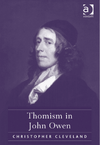bookslover
Puritan Board Doctor
On August 31, Owen Strachan (the author of that new book about Christianity and wokeness), authored two tweets:
"The Reformers, Puritans, Edwardseans, & Baptists all rejected the syncretistic philosophy of Thomas Aquinas. Today, a tiny handful of evangelical scholars urges us to baptize Aquinas."
and
"The idea that Thomas Aquinas is anything remotely approaching a proto-Reformer, or friendly to early forms of Reformation convictions, should cause you to snort your morning coffee straight out of your nose."
The pushback on these two tweets (especially the first one) was immediate and forceful. Folks pointed out that (I'm summarizing), even while rejecting Aquinas's sacramentalism and his transubstantiationism, the Puritans, from John Owen on down, very much appreciated Thomas's writings, as did other Protestant writers. (In fact, an entire volume, entitled Thomism in John Owen, by Christopher Cleveland, was published in 2013.)
Other books that were pointed out to Strachan included Aquinas Among the Protestants, edited by Svensson and VanDrunen, Thomas Aquinas: An Evangelical Appraisal, by Norman Geisler, and the brand new Oxford Handbook of the Reception of Aquinas, edited by Matthew Levering (who specializes in Aquinas) and Marcus Plested.
(Separately, I found another of Levering's books: Aquinas the Augustinian.)
At the very least, Strachan's view of the relationship of Thomas's writings and Protestant theologians, from the Reformers on, isn't very nuanced. The relationship is more complicated and subtle than Strachan apparently thinks it is. The number of works studying the relationship of Thomas's theology and Protestant theology has grown significantly in the last 25 years. Judging by Strachan's tweets and the reaction to them, it looks like Strachan has some reading to do.
"The Reformers, Puritans, Edwardseans, & Baptists all rejected the syncretistic philosophy of Thomas Aquinas. Today, a tiny handful of evangelical scholars urges us to baptize Aquinas."
and
"The idea that Thomas Aquinas is anything remotely approaching a proto-Reformer, or friendly to early forms of Reformation convictions, should cause you to snort your morning coffee straight out of your nose."
The pushback on these two tweets (especially the first one) was immediate and forceful. Folks pointed out that (I'm summarizing), even while rejecting Aquinas's sacramentalism and his transubstantiationism, the Puritans, from John Owen on down, very much appreciated Thomas's writings, as did other Protestant writers. (In fact, an entire volume, entitled Thomism in John Owen, by Christopher Cleveland, was published in 2013.)
Other books that were pointed out to Strachan included Aquinas Among the Protestants, edited by Svensson and VanDrunen, Thomas Aquinas: An Evangelical Appraisal, by Norman Geisler, and the brand new Oxford Handbook of the Reception of Aquinas, edited by Matthew Levering (who specializes in Aquinas) and Marcus Plested.
(Separately, I found another of Levering's books: Aquinas the Augustinian.)
At the very least, Strachan's view of the relationship of Thomas's writings and Protestant theologians, from the Reformers on, isn't very nuanced. The relationship is more complicated and subtle than Strachan apparently thinks it is. The number of works studying the relationship of Thomas's theology and Protestant theology has grown significantly in the last 25 years. Judging by Strachan's tweets and the reaction to them, it looks like Strachan has some reading to do.

